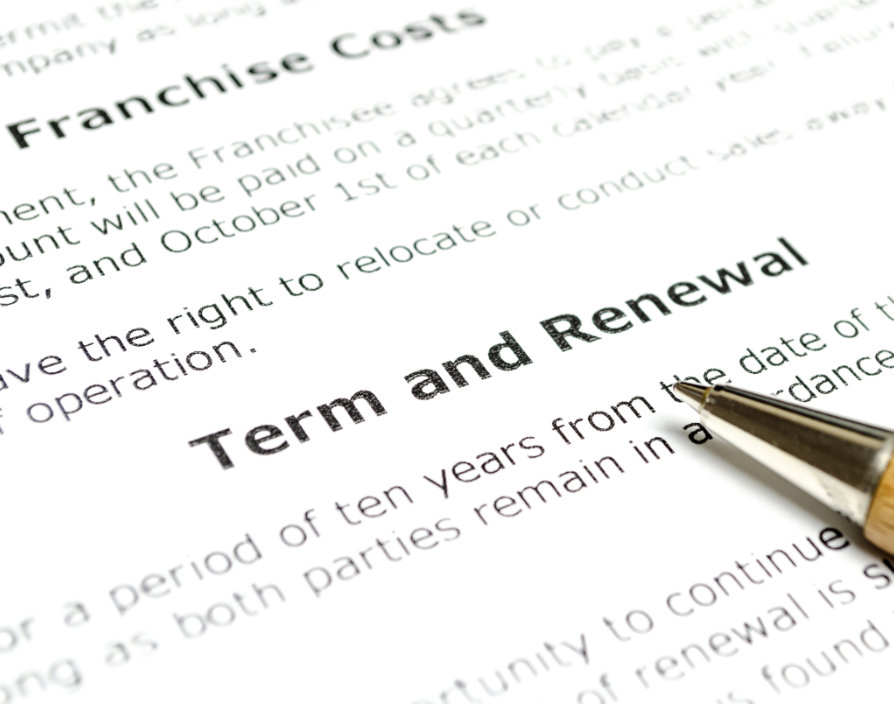It can also be a highly involved and often stressful period for franchisees and franchisors alike, where simmering differences come to a head and the commercial interests of franchisee and franchisor diverge. Issues over renewal were highlighted in last year’s cases of Winkworth Franchising Limited v Goble and The Burke Partnership v The Body Shop International Limited which confirmed that contractual conditions of renewal have to be met and franchisors cannot withhold renewal simply because it may no longer serve their commercial interests to continue on the same terms.
Given these recent cases, this article looks at some of the typical requirements of renewal and provides some guidance on how best to navigate the potentially choppy waters of the process.
Can you renew?
The starting point is to check the contractual rights to renew in the franchise agreement. Are these entirely at the franchisor’s discretion or does the franchisee have a contractual right to renew? if so is this subject to conditions?
Almost all modern franchise agreements grant franchisees a contractual right to renew but subject to certain conditions which must be fulfilled. Typical conditions include:
- Compliance with the terms of the franchise agreement by the franchisee either in all material respects or completely;
- The franchisee must notify the franchisor of their wish to renew by a specified deadline, which can be up to twelve months before renewal. The British Franchise Association’s (“BFA”) Code of Ethics recommends franchisors remind franchisees of the need to give notice and not to withhold renewal on a technicality where a franchisee has not notified in time;
- The franchisee and certain employees may need to undertake further training;
- Crucially, the franchisee is likely to be required to sign the latest version of the franchise agreement then being used by the franchisor, which may contain different terms and higher fees. The justification is that this helps ensure uniformity of contractual terms across a network, but this can be contentious where the terms being offered are significantly different to the original agreement and disadvantage the franchisee;
- Payment of a renewal fee and a waiver of claims, usually one sided in favour of the franchisor.
Any conditions attached to renewal must be strictly complied with and not taken lightly to ensure that franchisors cannot refuse renewal on technical grounds. Franchisees should also bear in mind that renewal is often tied to significant capital outlays (in the form of redecoration of premises, for example). The earlier that franchisees begin planning for such costs the better, not least as it will improve their chances of being able to negotiate any necessary funding.
Don’t leave it too late
Despite the importance of renewal, it can creep up on both franchisees and franchisors who are otherwise busy in the day to day running of their businesses. It might be tempting to think that tasks relating to a renewal that is many years away can wait until closer to the time, but the earlier that franchisees and franchisors start planning for renewal, the more streamlined the process should be.
Is renewal the best option?
This largely depends on how strained the franchisor/franchisee relationship is. Hopefully renewal is a given, the franchise agreement offered is commercially sensible and the relationship can continue. However, renewal is often a time that a franchisor can look to move an underperforming or difficult franchisee out of the network. Equally, a franchisee may have had enough and simply choose to cease trading and not renew, leaving the franchisor in a difficult position if it wishes to salvage the business. If a franchise agreement expires without renewal, then usually the agreement will end. This leaves the franchisee without the right to continue to trade and the franchisor usually has the ability to acquire the assets of the franchised business but is not obliged to give any value for the goodwill the franchisee has built up in that business (as the franchisee no longer has the right to trade). This can leave a franchisee with limited options so early negotiations are critical here to seek to achieve a compromise. If the franchisor does not have buy back rights, then this can leave them in a tricky position if the franchised business is trading well but the franchisee does not wish to renew on the terms offered. A franchisee would also need to understand the restrictions imposed if they do not renew and the franchisor does not buy back. Most franchise agreements impose restrictions on trading a competing business for a period of time following termination or expiry of the franchise agreement. The options available to either party need to be assessed well in advance and negotiations entered into to try to achieve a compromise.
Is there scope to change or negotiate terms?
As explained at paragraph 1 above it is usually a condition of renewal thatfranchisees renew on the franchisor’s then current form of agreement which gives franchisees little scope for negotiation. Despite that, franchisors should not assume that they can oblige franchisees to sign up to the current terms if they are materially different especially if no other franchisees are signed up to them. If the new terms offered would materially jeopardise a franchisee’s ability to make money from the franchised business, then a franchisee may well have arguments to challenge the requirement, particularly if the franchisor is exercising its contractual discretion by imposing the requirement.
How much is the renewal fee?
Renewal fees are common but are not typically more than the franchisor’s administrative or legal costs. However, some franchisors seek to charge far more at renewal and the issue should ideally be address when the franchisee initially enters into the franchise agreement. The BFA’s guidance is that it is unfair to make franchisees pay high renewal fees or risk losing their business. The grant of rights at renewal should be fair and franchisors should not attempt to create impediments to renewal. High renewal fees can impose an unfair financial burden on franchisees at a time when they are in a vulnerable position. Historically, the BFA has required its franchisor members not to charge renewal fees that go further than what is necessary to recover the franchisor’s costs of renewal except where this is justifiable. Abiding by this requirement remains good practice for franchisors.
Seek professional advice
Given the importance of renewal, taking the appropriate professional advice is key. For franchisees this advice may be in the form of legal advice on proposed renewal terms or accountancy, or taxation advice on any changes to their business structure that may be necessary at renewal. For franchisors, it may be on whether the changes they propose to make fall foul of the BFA Code of Ethics or guidance.
Franchisors acting in a potentially unethical way at renewal may well find that their recruitment success diminishes. Word spreads and prospective franchisees will not be so quick to join a network where the longevity of their business may be limited to an initial term due to the risks of disadvantageous terms being imposed on them at renewal. Equally, franchisees should play by the rules in ensuring that they comply with the conditions to renewal, provided these are not unconscionable or open to clear challenge. An organised and proactive approach coupled with professional advice should help ensure renewal is a smooth transition process into a further term.
Guest co-Author Alasdair McDowell

Alasdair is an associate in Stevens & Bolton LLP’s Commercial & IT department, and is a part of the Hospitality and Leisure Group. In addition to advising both franchisors and franchisees, Alasdair also advises commercial clients on a wide variety of topics including agency and distribution.

































